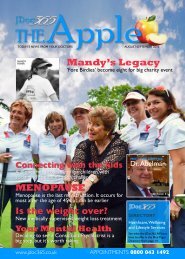Create successful ePaper yourself
Turn your PDF publications into a flip-book with our unique Google optimized e-Paper software.
Sixth sense<br />
By Dr. Herschil Lewin<br />
A doctors instinct<br />
can make all the<br />
difference<br />
I feel very privileged to be able to help my patients as a<br />
result of the study and training I have received, and the<br />
experience I have gained throughout my 30 year<br />
medical career.<br />
Whilst constant advances in medical science provide<br />
new insight, and the ability to prevent and treat many<br />
illnesses now, many doctors also posses an invaluable<br />
‘sixth sense’ when examining patients.<br />
Sometimes, an internal alarm bell<br />
will ring, and I will be compelled<br />
to check for something purely on<br />
an inexplicable ‘hunch’<br />
This happened to me not so long ago. A mother<br />
brought her nine month old baby boy to me for a<br />
check-up as he had a slightly raised temperature.<br />
Having conducted all the obvious checks with no cause<br />
for alarm, an inner voice told me that something was<br />
still not right. I referred the baby to hospital to be sure,<br />
and his mother took him straight there.<br />
When the baby was being examined in the hospital, he<br />
suddenly developed a rash which hadn’t been evident<br />
before. It turned out to be bacterial meningitis, so the<br />
appropriate medication was administered without<br />
delay. Thankfully he made a full recovery, thanks in part<br />
to being in the right place at the right time.<br />
Similarly, on another occasion a concerned mother<br />
brought her child to see me as he was struggling with a<br />
nasty cold. Maybe parents also develop a sixth sense<br />
when caring for their children, as suddenly his<br />
demeanour changed and I realised that something<br />
more serious was going on. I put the patient on the<br />
couch, and a moment later he stopped breathing and<br />
his eyes rolled up. Although terrifying for the patient<br />
and mother, we were quickly able to resuscitate him<br />
and return his vital signs to a normal level.<br />
Fortunately cases like this are very rare, but they do<br />
happen. Most of the time, the conditions are selflimiting<br />
and everything settles back to normal with little<br />
additional intervention. Even when more serious<br />
conditions are found, modern medicine can now treat<br />
them effectively. During my career, advances in medical<br />
science have given us access to new drugs and<br />
medication, and a deep understanding of how to<br />
administer them for the greatest effect. Guidelines have<br />
been developed to help us treat and monitor<br />
conditions, and there is a huge bank of research and<br />
information which doctors can access to help provide<br />
the best possible service to our patients.<br />
Having successfully tackled so many conditions, patients<br />
now live longer than ever before. As a direct result,<br />
new diseases like dementia have replaced them, and<br />
our aging population has new and different healthcare<br />
needs compared to previous generations.<br />
The challenge of meeting the needs of the patients of<br />
the future goes on. Further amazing advances in<br />
medical science continue to help, but the doctors sixth<br />
sense will always have an important role to play in<br />
looking after patients.<br />
<strong>FEB</strong>RUARY/<strong>MARCH</strong> <strong>2016</strong> 3





